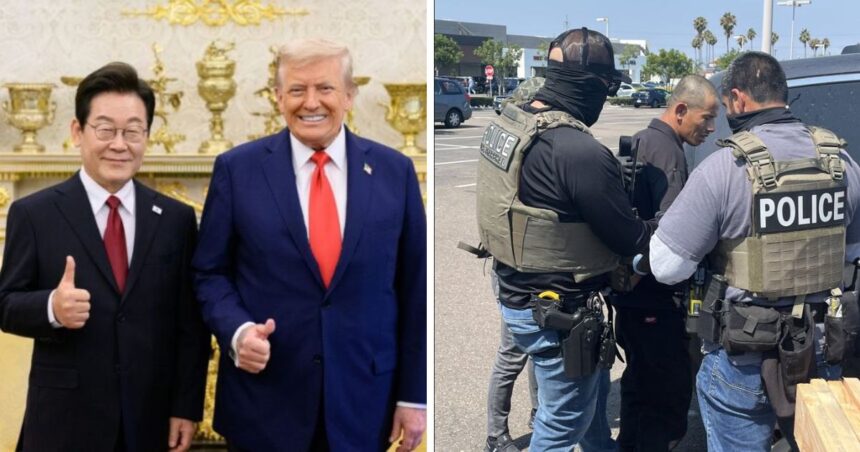In September 2025, a major incident occurred at a battery plant construction site in Georgia, United States. The site: a joint venture between Hyundai Motor and LG Energy Solution. The project: a multi‐billion‑dollar investment meant to power America’s electric vehicle future, create thousands of jobs, and reflect the strength of the U.S.–South Korea alliance. But everything ground to a halt when hundreds of workers—many from Korea—were detained in an immigration raid.
What unfolded was not just a local law enforcement action—it triggered diplomatic tensions, corporate caution, and worry among foreign investors. It begs the question, how policies meant to tighten borders and enforce immigration rules may be having unintended consequences on global investment and foreign relations.
On September 4, 2025, U.S. federal agents carried out one of the largest single‐site immigration enforcement operations in recent history. At the Georgia facility under construction—a $4.3 billion LG‐Hyundai EV battery plant—approximately 475 people were detained. Over 300 among them were South Korean nationals.
Authorities claimed that many detained workers were living outside the strict terms of their visas—working on visas like ESTA or B‐1 business visas which do not permit construction or equipment installation work.
South Korea reacted strongly. Its President Lee Jae‑Myung described the incident as “bewildering,” saying it could damage future investment in the U.S. by Korean companies.
LG Energy Solution responded by suspending most U.S. business trips, recalling staff, and advising that only essential personnel travel to the U.S., in an atmosphere of uncertainty.
Ultimately, a deal was struck: the detained workers are to be released and repatriated. But the damage may run far deeper.
This isn’t just about one plant or one raid. It’s about how tightening immigration enforcement, inconsistent visa rules, and surprise enforcement operations are shaking confidence among foreign firms.
Projects like the LG‑Hyundai plant don’t just depend on capital; they depend on personnel. Engineers, technicians, project managers.
Images of detained foreign nationals, being handcuffed or brought in large scale enforcement sweeps, do more than harm relations—they harm a country’s brand as a reliable place for doing business. Allies begin to wonder: under what circumstances will foreign workers be protected? How predictable and fair is the legal framework? For firms, unpredictability is a cost you can’t afford.
South Korea has voiced “regret” and concern, dispatched diplomats, called for better visa‑systems. If trust erodes, so too does cooperation. And this isn’t just about one country; other allies watching closely may second‑guess future investments in the U.S. under similar risk.
Future of Such Projects
On the U.S. side, the picture is mixed. The Trump administration has made strong statements about enforcing immigration law, ensuring foreign workers comply with visa restrictions, and protecting U.S. labor markets. It has also emphasized the importance of foreign investment and manufacturing in America
President Trump himself said: “We welcome investments. We encourage you to bring in your very smart people, with great technical talent … but legally.” He has also stressed “hire and train American workers” as a condition.
These dual aims—aggressive immigration enforcement on one hand, and welcoming foreign investment on the other—are inherently in tension. If the enforcement regime is heavy‑handed, opaque, or unpredictable, it can undercut the promise of safe, predictable investment climate even for allies.
Also, visa regimes like those for skilled work (e.g., H‑1B, or work visas) are complex, quotas constrained; many firms say they have depended on more flexible temporary or business visas for critical tasks in launching factories—until now. If those “workarounds” are suddenly policed strictly, there will be disruption.
The incident at the Hyundai‑LG battery plant in Georgia is more than just a raid; it is a warning. For foreign investors—especially allies—such events raise the question: can the United States be a reliable place for investment if legal, bureaucratic, and enforcement uncertainties threaten employees, projects, and partnerships?
If policies that aim to enforce immigration law end up chilling the very investment the U.S. claims to desire, or alienating its closest partners, then the strategy may backfire. Investment flows, especially in advanced tech, clean energy, and manufacturing, depend as much on trust and predictable legal regimes as they do on tax breaks or subsidies.
To preserve its position as a magnet for global capital, the U.S. must bring together its enforcement, immigration, trade, and foreign investment policies into alignment. Otherwise, allies will come to see “welcome” as conditional—and hesitate. In the end the widely considered greatest capitalist country on the planet may soon be seen as a dangerous place for investment, damaging and maybe even altering the US business brand for a long time to come.








